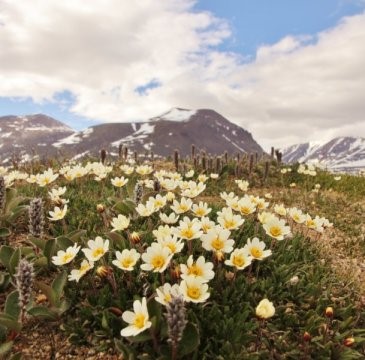(单词翻译:单击)
听力文本
This is Scientific American — 60-Second Science. I'm Christopher Intagliata.
The Greenland High Arctic is a bare, sparse place. Rather than tall trees, it has tundra—ground hugging vegetation—and rugged, Lord-of-the-Rings-style vistas. "Well I don't know, it's not exactly New Zealand, but kind of similar landscape."
Mikko Tiusanen, an ecologist at Helsinki University in Finland. "The winter season is like six, seven months. So everything basically happens during the short summer season." Including the white-yellow bloom of mountain avens, a hardy arctic shrub. "Even though it's small it can be over 100 yrs old. It's pretty good at surviving harsh conditions."
Tiusanen and his colleagues set out to census which of the many local insects visit mountain avens by summer, and help with pollination. So they planted 2100 sticky flower lookalikes, as traps, and identified stuck visitors by their DNA.

Two-thirds of all local insect species visited. But it was one particular fly, a relative of the humble housefly, that showed up most often in those spots where the tundra shrubs had successfully set seed. Meaning more flies appeared to be a good thing for the avens. The study appears in the Proceedings of the Royal Society: B.
Here's the bad news: a 2013 study found that the Arctic flowering season is shortening. The numbers of fly pollinators is down, as is the the number of visits by these fly pollinators. Which could be bad for mountain avens—and beyond. "One could expect that also the other pollinators and flower visitors visiting the mountain avens could get more uncommon and even become extinct in the long run." Meaning "shoo fly" could spell trouble for the life of the tundra.
Thanks for listening for Scientific American — 60-Second Science Science. I'm Christopher Intagliata.
参考译文
这里是科学美国人——60秒科学。我是克里斯托弗·因塔利亚塔。
格陵兰高北极地区是一个荒芜又稀疏的地方。那里没有高大的树木,有的是苔原、贴地的植被和崎岖的、类似魔戒风格全景的地方。“嗯,我不清楚,那里不完全是新西兰,而是一种类似的景观。”
米可·蒂乌萨宁是芬兰赫尔辛基大学的生态学家。“冬季大约有六七个月那么长。所以基本上一切都发生在时间很短的夏季里。”包括耐寒的北极灌木水杨梅盛开出黄白色的花朵。虽然看上去很小,但它的年龄已经超过了100岁。它非常擅于在恶劣的环境条件中存活下去。
蒂乌萨宁和他的同事开始调查在夏季“到访”水杨梅的当地昆虫,这些昆虫会帮助授粉。所以他们种植了2100株相似的粘纸花作陷阱,通过DNA来识别被粘住的“到访者”。
有三分之二的当地昆虫物种“到访”过水杨梅。其中有一种特别的苍蝇,这种苍蝇是家蝇的近亲,它们最常出现的地方是成功播种的冻原灌木区。这表明,对水杨梅来说,更多的苍蝇可能是件好事。这项研究发表在《英国皇家学会学报:B》上。
这里还有一个坏消息:一项2013年进行的研究发现,北极的花期正在逐渐缩短。授粉苍蝇的数量下降,“到访”的授粉苍蝇数量也出现下降。这对水杨梅和其他植物来说可能是坏消息。“可以想象,其他授粉昆虫和到访水杨梅者可能会越来越少,从长期来看甚至可能会绝迹。”这表明“赶苍蝇”这种行为可能为冻土地带的生活带来麻烦。
谢谢大家收听科学美国人——60秒科学。我是克里斯托弗·因塔利亚塔。
译文为可可英语翻译,未经授权请勿转载!
重点讲解
重点讲解:
1. be good at 擅长的;精通的;能干的;
例句:He is very good at talking opponents over to his viewpoint.
他善于说服对手改变立场转而赞成他的观点。
2. set out 开始;着手;
例句:The government set out to remove the dead hand of the state from economic life.
政府已在著手消除经济领域里的这一痼疾。
3. show up 出现;露面;
例句:Many TV stars show up in the evening party.
许多电视明星出现在晚会中。
4. in the long run 从长远来看;
例句:In the long run, one should save money for emergencies.
从长远看,应该存钱以备不测。


